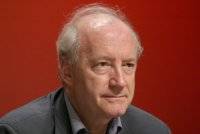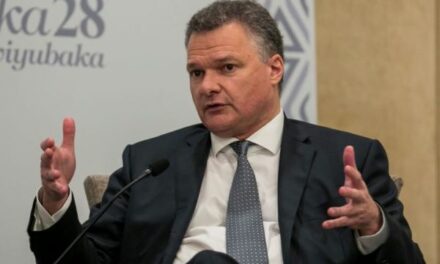
First Lady Jeannette Kagame comforts a girl after getting her vaccination from Dr Binagwaho. Minister Jeanne d’Arc Mujawamariya looks on (Photo: J. Mbanda).
NYARUGENGE – The First Lady, Jeannette Kagame, yesterday, launched the first ever comprehensive integrated cervical cancer prevention programme at a function held at Kanyinya Primary School in Nyarugenge District.
Speaking at the event, the First Lady noted that Rwanda is the first African country to roll out free Human Papilloma Virus (HPV) Vaccination for girls and screening for women.
While other African countries have the vaccine, people have to pay for it thus limiting the number of beneficiaries.
“For Rwanda to achieve free roll-out of this programme, we received support from Merck, Qiagen N.V, World Health Organisation and UNICEF,” Mrs Kagame said.
Over 100,000 girls across the country are expected to be vaccinated against HPV, which causes cervical cancer.
“Starting this week, thousands of young Rwandan girls and women will have an opportunity to live their lives without the threat of what has been a potentially fatal illness,” added the First Lady.
“There is no specific research (cervical cancer) that has been done in Rwanda, but local hospital reports indicate that cervical cancer is one of the major killers among women”.
Medics say that it is not a genetic disease. All women who have ever had sex are at risk of contracting this type of cancer.
Most girls usually get infected with HPV during their first sexual encounter.
“This is why Rwanda took the initiative to vaccinate girls at a tender age before they could get infected… so that in future, we have mothers who are free from this type of cancer,” the First Lady said.
She noted that for a child to have a high immune system, it was necessary for them to be immunised three times within a period of six months.
“They will get the vaccines from their schools. Teachers, parents and community health officials have to ensure that all girls between the ages of 11-15 get the vaccine,” she said.
The First lady urged local leaders to ensure that girls, within the targeted age group who are out of school, also benefit from the vaccination programme.
Dr. Mark Feinberg, the Chief Public Health and Science Officer at Merck Vaccines, said that the launch of the vaccine in Rwanda marks a new beginning in offering a better life to women and girls.
“Today, starting here in Rwanda, the world is changed and changed for the better.
Today marks a day when Rwanda shows the world that it is not acceptable to have so many wives, mothers and sisters and daughters die of cervical cancer,” he said.
Dr. Feinberg noted that cervical cancer was the leading cause of cancer-related deaths among women in Rwanda,.
“Today we have the opportunity to change the situation and show that the country can protect its women from cervical cancer. We now have the tools to prevent cervical cancer which is vision, innovation and political will, which are evident in Rwanda,” he said.
Dr. Feinberg said that for the first three years, Merck would donate 2 million doses of Gardasil at no cost.
The vice president of market development at Qiagen, Susan Keese, emphasised that the programme would be very important in protecting the lives of women, who play a vital role in the development process.
“Rwanda is the first country in the world to launch a comprehensive integrated cervical cancer prevention programme. This is an important event in the history and a new beginning for a better life for the girls and women of Rwanda,” she said.
“Rwanda, being the first country, gives her a major influence in the world.”
Keese pointed out that her organisation would provide 250,000 HPV screening tests alongside all necessary equipment and training at no cost.
Oliver Iribagiza, a mother to Lilliane Nyinawumuntu, who was vaccinated yesterday, said that she got to know about HPV over the radio and she took the initiative to bring her daughter for vaccination.
“It is my role as a parent to follow up on the health of my children, and from today, I will ensure that within the next six months, my daughter gets the full dose,” Iribagiza said.
http://www.newtimes.co.rw/index.php?issue=14608&article=40592
Posted by rwandanews




